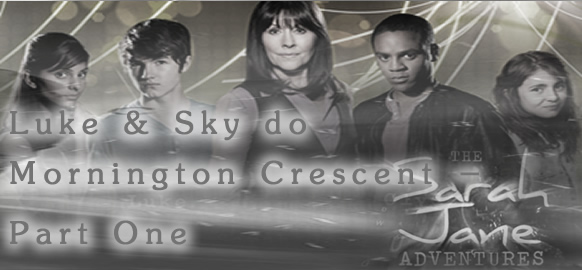

Luke and Sky Smith got off a red double decker bus and headed towards a London Underground station with its familiar logo that looked, to Luke, if nobody else, like the Greek letter ‘phi’ rotated ninety degrees. The station wasn’t open, yet. It was only six o’clock in the morning. Even so, three people walked down the unmoving escalator ahead of them and waited on the platform that bore the name ‘Mornington Crescent’ in red and white tiles on the curved wall.
“Those people aren‘t Human,” Sky whispered. “They’re wearing shimmer cloaks. They have chalk coloured skin and silver hair.”
“I think we’re technically the only humans here,” Luke answered as he looked around. “At least we have Human DNA. We were both born a bit different. That’s why we can recognise shimmer cloaks and perception filters. Plus, I’ve been in The Doctor’s TARDIS, so I can recognise the different languages being translated into my ear.”
There were at least thirty people in groups or couples and none of them waiting for a train. Instead they all turned to look as a door marked ‘staff only’ opened and a strange figure emerged. He obviously liked gold. His electric wheelchair was gold. He wore gold chains around his neck and gold rings on his fingers. His clothes were gold. The two women who accompanied him weren’t wearing much, but the crop tops and mini skirts were golden. They carried gold coloured baskets full of gold envelopes.
“That must be Lord Arthur Sweetwell,” Sky guessed. “He looks a bit….”
She wasn’t sure what he looked like, and she was a bit nervous about meeting him. They had both heard from Sarah-Jane about Lord Sweetwell, a man from the future who retired to the past and invented a time travelling game called Mornington Crescent in which teams followed clues and collected souvenirs to win a fantastic prize.
Sarah-Jane had played the game with The Doctor when she travelled with him. Sky had innocently enquired about how old she was when she did that and discovered that she was in her early twenties – just a bit older than Luke was, now.
When Sarah-Jane had been reminded of that, there was almost no argument she could use to prevent the two of them going for the Quest themselves. She tried a few tactics, but the dangerous things they had all done for as long as Luke could remember mitigated against her. Eventually she agreed that they could have this weekend adventure on their own.
So there they were with spare clothes and other essentials in backpacks and cold drinks and energy bars in their pockets as they waited to be called up to receive their first clue in a gold envelope.
“Luke and Sky Smith,” the man called out. The crowd parted to let them reach Lord Sweetwell. He smiled in what he probably thought was a welcoming way.
“Well, well,” he said as he held Sky’s hand just a bit too long. “I remember your mother very well. A charming young lady. How is she?”
“She’s very well, thank you,” Sky answered. There really was no other answer.
“I understand you two have your own vortex manipulator?” Sweetwell added.
“It was loaned to us by a friend of mother’s, a lady called River Song. She heard we were interested in the Quest and gave it to us.”
Luke showed him the leather wristlet he was wearing.
“One of the deluxe models,” Lord Sweetwell pronounced. “With telepathic control. Once you know where and when you’re going you just have to press the red button and think carefully about your destination. Don’t get distracted while you’re doing it, though. You could interrupt your journey in most unexpected ways.”
“We’ve tried a few short trips to make sure we know how it works,” Luke assured him. “I think we’ll be all right.”
“You’re the youngest ever participants in the Quest. I wish you good luck and a safe journey.”
Luke thanked him and took the gold envelope. He and Sky went up the escalator and through the open ticket barrier to the street outside. They stood by the statue of Richard Cobden, political reformist, and looked at their clue.
“Chalk it up to experience when you get the needle at Étretat. P.S. look out for the White Bird.”
“What does that mean?” Sky asked.
“I’m finding out,” Luke answered. He reached into his jacket pocket for his Android tablet, a device that had no enhancements from Mr Smith, no boosting from the TARDIS or any other extra sophistication, but which gave him all the information he needed for an adventure like this.
“Étretat is a small town on the coast of Normandy with spectacular chalk cliffs,” he reported after a few minutes of consultation with Wikipedia. “Chalk being a soft porous sedimentary carbonate, the coastline has some beautiful arches eroded by the sea over the years and a stand-alone piece of rock known as ‘The Needle.”
“Well, that was easy,” Sky responded. “What about the White Bird?”
“That’s explained here, too,” Luke answered. He put the tablet away safely and took his sister’s hand. She closed her eyes because travelling by Vortex Manipulator was a funny experience. He closed them to fully visualise the Étretat coastline as he pressed the red button.
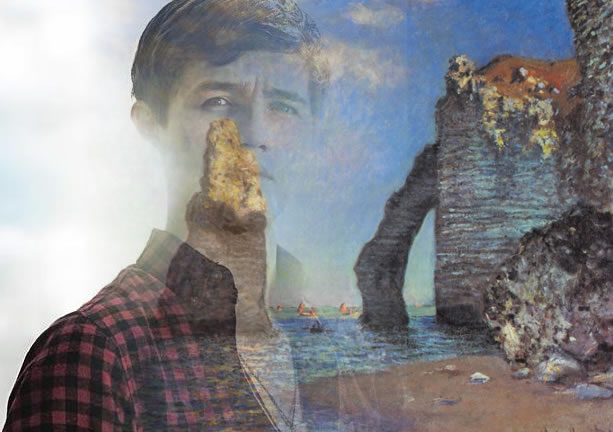
“Wow!” Sky exclaimed a moment later when she opened her eyes again and found herself standing on a beach of eroded chalk next to a high cliff rippled with wind-eroded contours. One of the famous arches still attached to the cliff kept one foot in the sea just ahead, while the Needle, cut off from the mainland hundreds of years ago, tapered to a point some seventy metres above the lapping tide.
“Not quite right,” Luke admitted. “I tried to visualise us on top of the Needle itself, but then I realised how dangerous that would be, and we landed here on the beach.”
There was no obvious flat part of the Needle to stand on, so Sky thought it absolutely WAS the safest option.
“Look at those cliffs. It’s like the White Cliffs of Dover.”
“Same chalk plateau,” Luke told her. “It runs right under the English Channel. Millions of years ago when Britain was attached to Europe this would all have been the same land.”
Sky thought about that for a while. It was almost too big a thing to imagine that they were standing where solid rock once continued all the way home to Britain.
“What about the White Bird?” she asked. “There are plenty of seagulls around, and lots of them are white-ish, but….”
Luke checked his watch and noted that the time was wrong. He looked at the temporal clock on the vortex manipulator. Then he listened for a sound beyond that of an ebb tide and the screech of seagulls.
“Yes!” he exclaimed at last. “Look up into the sky. Keep looking.”
Sky looked. Now she could hear the sound, too. It was an engine, maybe more than one engine. Soon she was sure of it. There were different tones to the engines.
Then two small bi-planes with red white and blue roundels denoting that they were part of the French Army’s Air Corps passed over the cliffs and out to sea. They were followed by a much bigger bi-plane that carried two pilots, one behind the other.
It was white.
The big plane was followed by two more military planes that were clearly escorting it.
“It’s just gone eight o’clock in the morning on May the Eighth, Nineteen-twenty-seven,” Luke explained to his sister. “That was the last sighting from mainland Europe of L'Oiseau Blanc, the White Bird, piloted by Charles Nungesser and François Coli. They were trying to make the first transatlantic flight. Sadly, after passing over the south coast of England and Ireland the plane was never sighted again. Nobody know what happened to it. In another ten days Charles Lindbergh will go from New York to Paris and get the glory instead.”
“That’s sad,” Sky remarked. “I suppose they must have crashed into the sea.”
“Yes. There’s no real reason why we were here to see it except for the buzz of seeing historical things. We’re unique in our time, now. I still have to get to the Needle for our next clue.”
“You, not us?”
“I looked at all the pictures of the Needle online. There are sunsets and sunrises, loads of bright blue sky and sea, even a painting by Claude Monet, and in none of them is there any dry land between the cliffs and the Needle. The tide never goes out far enough. I’m going to swim over there and climb up. I need you to wait here.”
“Because you think I’m too young, or because I’m a girl?”
“Both, Plus you’re my little sister and I love you. And, because mum would flay me alive if anything happened to you.”
Sky wasn’t impressed by either argument, but then again, swimming out to the needle, then climbing up there without any climbing equipment, didn’t look fun.
“All right,” she conceded. She sat down on the white-grey sand and looked out across the sea thinking about the sad journey of the White Bird rather than the fact that Luke was stripping down to a pair of shorts for his swim. There were some things sisters didn’t need to dwell upon.
The water got deep very quickly and Luke swam strongly with the receding tide. The Needle was about fifty metres from the shore – two lengths of the swimming pool where both of the siblings had swum every Thursday afternoon at school. Sky watched as her brother hauled himself up onto a slight ledge just above the lapping water. He rested before climbing up the Needle, finding handholds here and there in the rugged surface.
He was good at it. Sky felt a reflected pride in her brother as he stopped a little more than halfway up the Needle. He had found a small niche worn into the rock and within it was the clue they sought. He waved triumphantly and then dived smoothly into the water.
“What is it?” Sky asked as he reached the shore and stood up, dripping but grinning from ear to ear.
“Its… a visual clue,” Luke answered. “Here, you figure it out while I dry off and get dressed.” He opened his backpack and found a towel and fresh clothes while Sky took the two-inch long figure and set to work finding out what it signified. She looked at it carefully and then reached for the tablet to do a Google search.
By the time Luke was dressed she had an answer.
“This little figure is a model of a full size statue called ‘The Cardinal’ by an artist called Giacomo Manzú. It is in a place called Middelheim Sculpture Park near Antwerp in Belgium. It looks like a great place. Even better than here. And there’s a café. We can eat after we find our clue.”
“All right,” Luke agreed. “Off we go, then.”
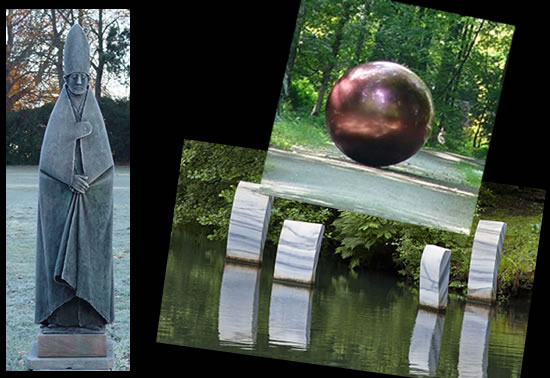
The vortex manipulator worked perfectly. They arrived at Middelheim mid-morning on a mid-summer day, right in front of the grey statue of a Cardinal in his pointed hat and cloak drawn around him. The plaque beside the statue explained that Manzú had created at least fifty ‘Cardinals’, sitting, standing, in various poses. This was just one of them.
“Here,” Luke said, reaching up to the Cardinal’s shoulder where another miniature sculpture was sitting.
“How is that possible?” Sky asked. “How could anyone know we were going to be here, right now, to find that. What is it, anyway?”
It looked like a bronze marble. How it had stayed on the Cardinal’s shoulder without rolling away was another mystery. Luke had no idea how to answer either of them.
“Mum said she asked The Doctor when they were doing the Quest, and even he didn’t know. He said ‘Magic’ and then quoted Clarke’s Law.”
Sky frowned for a moment as she searched her memory for a fact not found in the National Curriculum under any subject.
“Any sufficiently advanced science will look like magic to primitive people.”
“And, HE says, any sufficiently advanced magic will look like science. I’m not sure which this is. Mum says just ‘go with it’.”
“We have to ‘go’ that way,” Sky confirmed having checked Middelheim’s official website. “The full size marble is in the woods over there.”
The full sized ‘marble’ was big enough to be a single person space capsule. Luke was certain there were such things in the universe. It glittered in the dappled sunlight through the trees. It was identified as Yayoi, by American sculptor, Corey McCorkle, as tribute to Japanese sculptor Yayoi Kusama.
Luke really wished Clyde Langer was there with him. They would be able to have a great debate about what made a bronze sphere sitting in the middle of a path in the woods ‘art’. He suspected phrases like ‘redundancy of purpose’ and ‘incongruity of location’ would come into it. Essentially it was art BECAUSE it was sitting there in a woodland glade in a sculpture park.
“Remember the teenager who left a pair of glasses on the floor of the San Francisco Museum of Modern Art and people thought they were an exhibit,” he said. “I wonder if I piled up my wet stuff from swimming at Étretat, people would think THAT was art?”
“No, they’d think there was a streaker in the park,” Sky replied with a cheeky grin. “Look, there’s another clue.”
“Or somebody’s been littering,” Luke suggested.
“No, this is a clue. A really pretty one.” Sky picked up the small object sitting on the ground next to the sphere. It was a tiny diorama, smaller than Sky’s palm, depicting a small pond with overhanging trees and four white blocks like sugar lumps in the water.
“Yes, I get it,” Luke concluded. “It’s not far from here, in these woods.”
As they walked under mixed deciduous trees with varying textures and colours that seemed artistic in themselves, Luke read out the description from the official website of Luciano Fabro's Bathers – an installation of four pieces of white marble placed actually in a pond in the woods.
“By placing the works in water he created an entirely individual dynamic and interaction: between the stones themselves, between the stones and their surroundings, and between the stones and people. The hard, cold marble takes on an almost human, personal quality as our interpretative gaze glides across the reflections of sunlight in the rippling water and onto the marble’s gleaming veins. The marble, at times, seems to move, especially when a breeze makes the leaves flutter.”
“That sounds lovely,” Sky said. “We could sit for a while and have some pop and crisps.”
“As long as we don’t leave the empty bottles and packets as a new artwork,” Luke agreed.
But they never got to appreciate the tranquillity that Luciano Fabio intended. Just as the sun-bathed pond came in sight between the trees they both heard a splashing noise and a woman screaming for help. Luke didn’t hesitate before breaking into a run towards the sound. Sky waited a few seconds longer before hurrying after him.
To be continued….
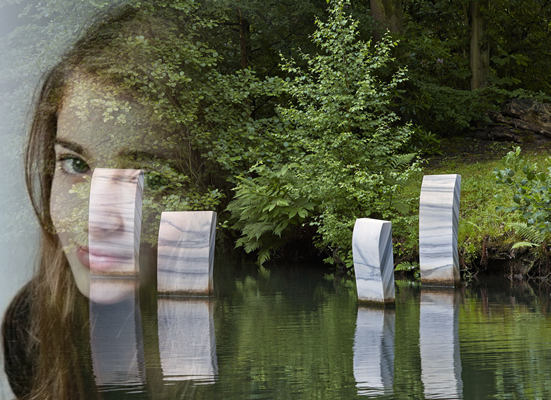
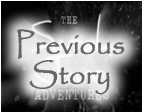 |
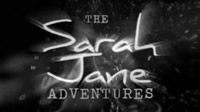 |
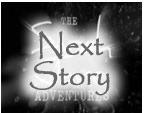 |